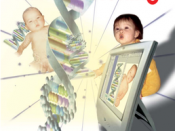Of all the terms coined by scientists, which have entered popular vocabulary, "Clone" has become one of the more emotive. Strictly speaking a cone refers to one or more offspring derived from a single ancestor, whose genetic composition is identical to that of the ancestor. No sex is involved in the production of clones, and since sex is the normal means by which new genetic material is introduced during procreation, clones have no choice but to have the same genes as their single parent. Simply speaking, clones are identical copy of their parents.
About five years ago, on February 12th 1997, an event in genetic history occurred which changed our prospective of what we know as "reproduction". A new element was introduced by the birth of a unique sheep named Dolly. After this event, and many more coming afterwards including cloning of animals and plants, a question lingers in minds of many people.
Is human cloning possible? Should it be a part of our society? How it would affect our lifestyles? Before giving an answer to these questions, we should first look into the case and check for different advantages and drawbacks of this event.
Firstly, I would like to discuss about the advantages of the process. Basically, the main theme behind the process of cloning is to improve man's life and serve humanity. Due to ever increasing population there's a possibility that the supply of food and resources might have a shortage. By cloning, better yields of plants and animals can be produced which could supply enough food for all population as those ones are being reproduced again and again.
Cloning can improve a person's health. In the present day, we are being attacked by numerous diseases like diabetes, Parkinson's and Cystic Fibrosis. As life stock can...



Cloning
Your essay, although good in length needs "something." You have a few spelling errors, and for that i would recommend a dictionary, your grammatical structure is good. You left out some important details about cloning, some extra research could make this an even better essay. But other than that, good job. Please do not take this comment as being too harsh, I am just trying to give you some hints.
0 out of 0 people found this comment useful.